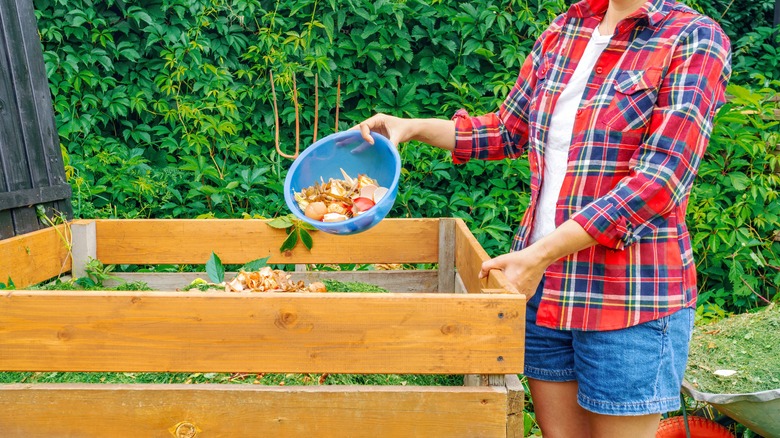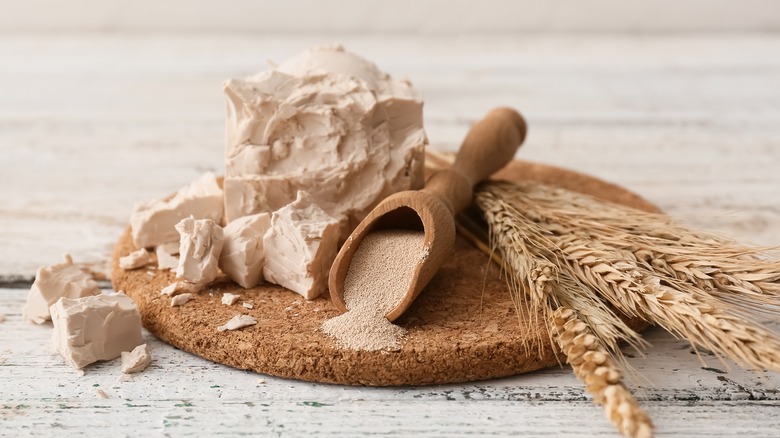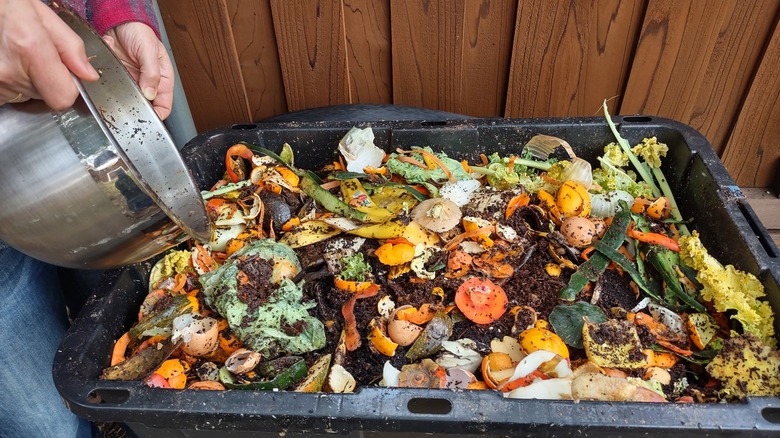Add This Kitchen Ingredient To Your Compost Pile To Accelerate Decomposition
Making your own compost is both beneficial to the environment, because it keeps food and garden waste out of landfill, and your garden, because it provides your plants with nutrient-rich humus. The decomposition process uses bacteria or microbes found in the materials you add to break down these materials into nutrient-dense soil for your garden. But it's not only bacteria that are beneficial in breaking down compost. Fungi are also helpful because they can break down more complex cellular structures. Common fungi useful in compost are molds and yeasts.
Adding yeast, which is a form of fungus, to your compost can be beneficial because the active yeast carries out a different function than the bacteria commonly found in compost. By adding this kitchen ingredient to your compost, you're helping to effectively speed up the composting process. But, adding yeast to compost is not the only way that you can use this common kitchen ingredient. You can also use it to banish mosquitoes from your yard by mixing it with some sugar.
What is yeast?
To understand how yeast can help the composting process, we first need to know what yeast is and what it does. The yeast that you have in your kitchen is usually labeled as baker's yeast. It's a single-celled fungus known as Saccharomyces cerevisiae. The dry yeast that you buy is dormant and needs to be activated so that it can grow. To activate the yeast, you need to add water, sugar, and warmth. Once active, the yeast is responsible for producing carbon dioxide, which creates the air pockets in the dough that later becomes bread.
But as a living organism, yeast needs a warm environment to be able to perform its function. If the environment is too cold, the yeast will take much longer to reproduce, but if it's too hot, the organism will die. Now that you know this, you'll be able to understand how yeast can perform in compost and when it should be applied.
Another way that yeast is commonly used is to make beer and wine. This is because the yeast also uses sugar to produce alcohol. If you like to brew your own beer, you can put any leftover yeast in your compost. Plus, you might like to know why beer traps are the easy way to keep slugs out of your garden.
What function does yeast perform in your compost?
Yeast can be a useful additive to your compost because it will help to break down organic materials that are too acidic for bacteria to grow. In addition, the yeast can help to break up tough fibrous materials so that the bacteria or microbes can then continue the composting work. You'll also find that the microbes are more active as the compost heats up, which helps speed up the composting process. On the other hand, fungi or yeasts will be more active during the cooler composting phase. That's why you only want to add a little yeast just after you've added some scraps from your kitchen. The yeast will work on the fibrous materials first and help to break these down so that the scraps are more easily digested by the microbes in the compost pile.
Once your compost pile heats up as the bacterial decomposition increases, the yeast will usually die because the environment will be too hot for the organisms to survive. So, to use yeast effectively to speed up your compost, just scatter a spoonful over the kitchen scraps when you add them to your compost pile and mix it in a little. Don't add too much, as this may create an imbalance in your compost pile. Now that you know that yeast is beneficial to your compost pile, you might be keen to learn about another common ingredient you should start adding to compost as well.


